| Srl | Item |
| 1 |
ID:
191734
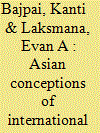

|
|
|
|
|
| Summary/Abstract |
How do major Asian states regard the current international security order? Do they agree or disagree among themselves? This is an introduction to a special section on ‘Asian conceptions of international order: what Asia wants’. It draws on articles analysing the stances of China, India, Japan, South Korea, Indonesia, Malaysia, Singapore, Thailand, Philippines and Vietnam towards the existing international security order usually described as a liberal international order (LIO). It argues that Asian states substantially support the main constitutive and regulatory norms and institutions of the LIO, but they worry that the LIO does not consistently honour these norms. Asians disagree on the centrality of political liberalism, but even Japan and South Korea, the most liberal states, are uncomfortable with strident criticism, punishment and the exclusion of less liberal states. Asians also disagree on the role of US alliances: some are strongly supportive, some are ambivalent and some are negative. Finally, Asians disagree on how they voice dissatisfaction. Japan and South Korea supplement existing norms and institutions as a way of transcending the limitations of the LIO; south-east Asian states promote ASEAN's mediatory role for peace and security above and beyond existing global arrangements; and Indonesia, India and China want to move from being norm takers to becoming norm shapers. The introduction ends with six policy implications.
|
|
|
|
|
|
|
|
|
|
|
|
|
|
|
|
| 2 |
ID:
149537
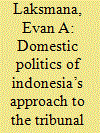

|
|
|
|
|
| Summary/Abstract |
Indonesia’s immediate response to the 12 July ruling by the Arbitral Tribunal was under-whelming. The foreign ministry issued a bland, lacklustre five-sentence statement:
|
|
|
|
|
|
|
|
|
|
|
|
|
|
|
|
| 3 |
ID:
106549
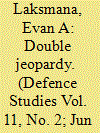

|
|
|
| 4 |
ID:
108422


|
|
|
| 5 |
ID:
092278
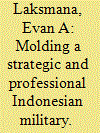

|
|
|
| 6 |
ID:
116368
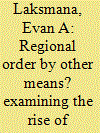

|
|
|
|
|
| Publication |
2012.
|
| Summary/Abstract |
This article seeks to address why and how defense diplomacy in Southeast Asia has risen in the past decade. By examining multilateral defense diplomacy under the auspices of the Association of Southeast Asian Nations (ASEAN) and the ASEAN Regional Forum (ARF), as well as Indonesia's bilateral defense diplomacy, this article makes three arguments. First, bilateral and multilateral defense diplomacy in Southeast Asia complement one another. Second, the focus of multilateral defense diplomacy has evolved and now reflects the blurring distinction between nontraditional and traditional security issues. Third, the rise of ARF's multilateral defense diplomacy can be attributed to the concern over China's rise, while ASEAN, considers it as among the key mechanisms to recover from the fallout of the 1996 Asian financial crisis and the recent regional arms development.
|
|
|
|
|
|
|
|
|
|
|
|
|
|
|
|
| 7 |
ID:
156559
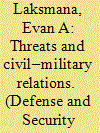

|
|
|
|
|
| Summary/Abstract |
This article explains why Singapore, despite its small size and semi-authoritarian regime, retains one of the best military forces in the Indo-Pacific. It unpacks Singapore’s ability to continuously innovate since the 1960s – technologically, organizationally, and conceptually – and even recently joined the Revolution in Military Affairs bandwagon. Drawing from the broader military innovation studies literature, this article argues evolutionary peacetime military innovation is more likely to occur in a state with a unified civil–military relation and whose military faces a high-level diverse set of threats. This argument explains how the civil–military fusion under the People’s Action Party-led government since Singapore’s founding moment has been providing coherent and consistent strategic guidance, political support, and financial capital, allowing the Singapore Armed Forces to continuously innovate in response to high levels and diversity of threats.
|
|
|
|
|
|
|
|
|
|
|
|
|
|
|
|